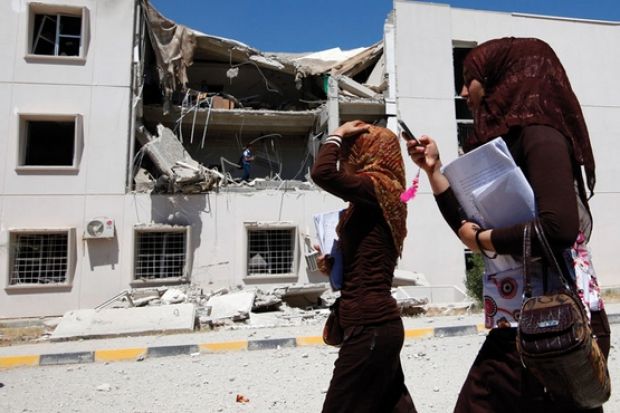Source: Reuters
Beyond tragedy: post-conflict recovery courses are popular at places such as the University of Libya but are not a long-term solution
International aid for African countries recovering from civil war is creating an oversupply of university courses geared around post-conflict recovery, a conference has heard.
Kenneth Omeje, professor of international relations at the United States International University in Nairobi, Kenya, said that the millions of pounds available from international agencies to help countries rebuild after war had distorted the provision of higher education courses in sub- Saharan Africa.
Speaking at Going Global, the British Council’s conference for international higher education leaders, in Dubai (4-6 March), Professor Omeje said that courses in disarmament, security reform, governance, peace studies and counselling for former combatants and war victims were very popular in countries such as Liberia, Democratic Republic of Congo, Sierra Leone and South Sudan. This was because graduates could easily find jobs with international aid agencies after qualifying.
“These are the sort of jobs that boom in post-conflict countries,” Professor Omeje said. “But it is unsustainable, as the major international stakeholders will eventually withdraw their peace and post-conflict agencies after two or three years, then people are thrown out of [employment].”
Professor Omeje said that universities and international aid agencies needed to ensure that higher education did not neglect subjects that could deliver long-term prosperity and peace.
“Mainstream higher education should not be designed and orientated just to provide employment-driven education courses,” he said.
“It tends to lead to a neglect of a number of aspects of the economy that are important to a country - courses such as agriculture, livestock production and infrastructure rebuilding.”
Professor Omeje said that universities in sub-Saharan Africa also needed to engage with their local communities who often viewed them as “ivory towers”. By “focusing on the practical challenges that face people in everyday life”, universities would overcome this “ivory-tower fixation which has bedevilled sub-Saharan Africa”, he argued.
“People see them as exclusive ivory towers that exist in a place between God and man,” he explained. “They have alienated many communities, which is why universities are targeted by rebels [during civil war] who feel they are not for them.”
Anis Ahmad, vice-chancellor of Riphah International University, in Pakistan, also said that universities should do more to promote social justice in post-conflict societies than simply training a skilled labour force.
“When we talk about promoting a ‘knowledge economy’, it is an extension of the capitalist vision - it is not enough,” Dr Ahmad said.
“Universities should have a humanistic purpose - it seems there is no longer room for spirituality.”
Universities should give students the tools to examine societal problems, rather than just a set of skills for the workplace, he argued.
“[Graduates] are viewed as elite labourers who do certain jobs, but that is not a way to solve [society’s] problems,” he said. “In a society where people are denied justice, universities have to play a role - they cannot be neutral.”
Register to continue
Why register?
- Registration is free and only takes a moment
- Once registered, you can read 3 articles a month
- Sign up for our newsletter
Subscribe
Or subscribe for unlimited access to:
- Unlimited access to news, views, insights & reviews
- Digital editions
- Digital access to THE’s university and college rankings analysis
Already registered or a current subscriber? Login




